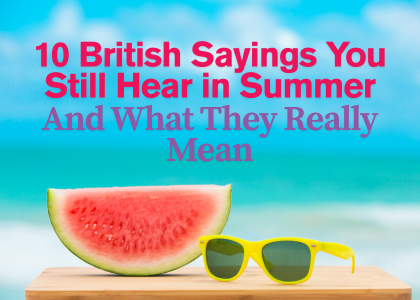Decode the quirky world of British summer slang and discover the stories behind the sayings.
The great British summer. Two glorious weeks of sunshine, followed by a month of drizzle and disappointment – and a nation determined to make the most of it anyway. As we dust off our barbecues, flock to the nearest patch of grass, and insist it’s “not that cold really,” it’s also the perfect time to unpack some brilliant British sayings you’ll hear all season long.
At Gamesium, we’re obsessed with where phrases come from (hello, Phrasium), so we’ve rounded up 10 classic British expressions that pop up when the sun comes out – and revealed what they really mean.
1. “It’s cracking the flags”
Translation: It’s unbelievably hot.
Origin: Believed to come from the idea that flagstones are cracking due to the heat.
2. “The sun’s got his hat on”
Translation: It’s a sunny day – time to celebrate!
Origin: From the classic 1932 British song “The Sun Has Got His Hat On (Hip-Hip-Hip-Hooray!)”. Often said with a touch of humour or nostalgia, this phrase captures the cheerful mood of unexpected sunshine.
3. “Mad dogs and Englishmen go out in the midday sun”
Translation: Only the foolish (and Brits on holiday) venture out in peak heat.
Origin: Made famous by Noël Coward’s satirical song – a cheeky jab at British bravado in tropical climates.
4. “Fair-weather friend”
Translation: Someone who’s only around when times are good.
Origin: From seafaring roots – “fair weather” means calm sailing, so a fair-weather friend disappears when storms come in.
5. “Donkey’s years”
Translation: A very long time.
Origin: A pun on “donkey’s ears” (which are long) – and Cockney rhyming slang might be involved, too.
6. “As red as a lobster”
Translation: Sunburnt to a crisp.
Origin: Self-explanatory – and a rite of passage for many a Brit abroad.
7. “Make hay while the sun shines”
Translation: Seize the moment – especially when the weather cooperates.
Origin: Agricultural, dating back to medieval times when farmers had to take advantage of dry days.
8. “Feeling the heat”
Translation: Under pressure – or literally baking in the sun.
Origin: WWI and boxing slang, later used in police interrogations (“the heat’s on”).
9. “The weather’s turned”
Translation: It’s gone from good to bad. Instantly.
Origin: An everyday phrase but very British – because no summer is safe from a sudden downpour.
10. “There’s not a cloud in the sky”
Translation: It’s unusually clear — and we’re both delighted and suspicious.
Origin: This phrase dates back to the 19th century and was popularised in pastoral poetry and early weather reporting. It paints a picture of idyllic summer skies, often with a hint of dramatic flair — and is now commonly used with either genuine joy or ironic British humour when there’s even one cloud on the horizon.
Love Phrases Like These?
You’ll adore Phrasium: The Origin of Phrases Game – the hilarious, clever card game that uncovers the weird and wonderful roots of everyday sayings. Perfect for garden parties, pub nights, or lazy afternoons in the park.
Test your phrase knowledge, impress your friends and learn something new.

